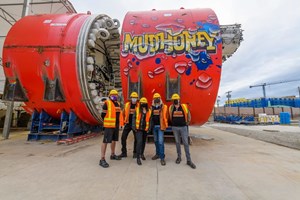Tunnel Boring Machine “MudHoney” Ready to Get to Work in Seattle
The Tunnel Boring Machine (TBM) “MudHoney” was lowered into the ground in Seattle, Washington, ready to get to work on the Ship Canal Water Quality Project.
The Ship Canal Water Quality Project is a $570 million program, being performed by The Lane Construction Corporation, the U.S. subsidiary of the Webuild Group. Lane has a $255 million share of the project. When completed, the tunnel will prevent, on average, up to 75 million gallons of polluted stormwater and sewage from entering the Lake Washington Ship Canal, Salmon Bay, and Lake Union each year.
Currently in dry weather conditions, all sewage flows to a local wastewater treatment plant. During wet weather conditions, polluted runoff can exceed the pipes’ capacity and send a mixture of stormwater (90%) and sewage (10%) to outfalls that flow into the nearest water body. These combined sewer overflows, or CSOs, contain contaminants that can affect public and environmental health.
The new 2.7-mile, 18’10” diameter tunnel will capture and temporarily hold more than 29.6 million gallons of stormwater and sewage during heavy rains. When the storm passes, flows will be released to the treatment plant.
The project is expected to be completed by 2025 and is a joint project between the City of Seattle and King County.
The Ship Canal Water Quality Project adds to Lane’s portfolio of work in the western United States, where it is actively constructing a $705 million highway project (of which Lane has a 40% share of) in the City of Bellevue, Washington, and another $400 million roadwork project in San Bernardino, California.
Lane also has ongoing tunnel work in Washington, D.C. and Fort Wayne, Indiana, among other complex, multi-sector projects throughout the country.
Related News
From Archive

- Glenfarne Alaska LNG targets late-2026 construction start for 807-mile pipeline project
- U.S. water reuse boom to fuel $47 billion in infrastructure spending through 2035
- $2.3 billion approved to construct 236-mile Texas-to-Gulf gas pipeline
- Major water pipe break in Puerto Rico hits over 165,000 customers
- Potomac River Tunnel project enters construction phase beneath Washington, D.C.
- Pennsylvania American Water launches interactive map to identify, replace lead water service lines
- Trump's tariffs drive $33 million cost increase for Cincinnati sewer project
- Utah city launches historic $70 million tunnel project using box jacking under active rail line
- Tulsa residents warned after sewer lines damaged by boring work
- Fatal trench collapse halts sewer construction in Massachusetts; two workers hospitalized




Comments